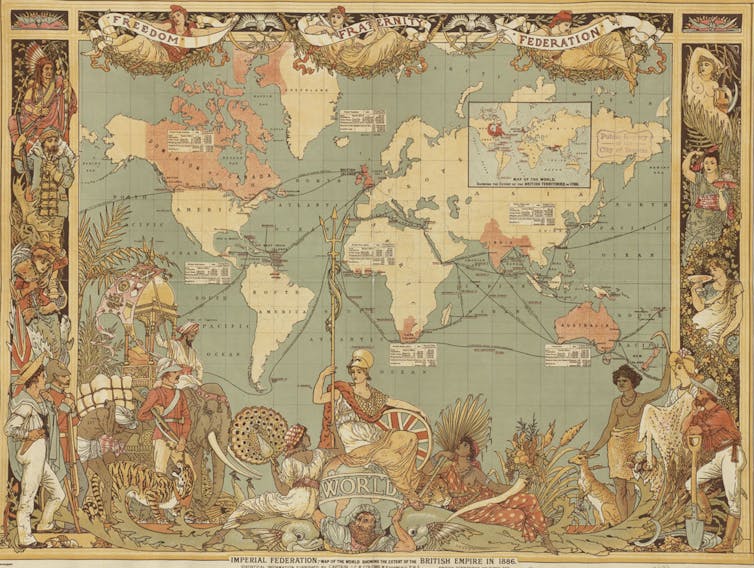By Steve Schifferes, Metropolis St George’s, College of London
That is the primary in a two-part collection. Learn half two right here.
For almost 4 centuries, the world financial system has been on a path of ever-greater integration that even two world wars couldn’t completely derail. This lengthy march of globalisation was powered by quickly growing ranges of worldwide commerce and funding, coupled with huge actions of individuals throughout nationwide borders and dramatic modifications in transportation and communication know-how.
In response to financial historian J. Bradford DeLong, the worth of the world financial system (measured at fastened 1990 costs) rose from US$81.7 billion (£61.5 billion) in 1650, when this story begins, to US$70.3 trillion (£53 trillion) in 2020 – an 860-fold enhance. Essentially the most intensive intervals of progress corresponded to the 2 intervals when international commerce was rising quickest: first throughout the “lengthy nineteenth century” between the top of the French revolution and begin of the primary world conflict, after which as commerce liberalisation expanded after the second world conflict, from the Nineteen Fifties as much as the 2008 international monetary disaster.
Now, nonetheless, this grand challenge is on the retreat. Globalisation is just not useless but, however it’s dying.
Is that this a trigger for celebration, or concern? And can the image change once more when Donald Trump and his tariffs of mass disruption depart the White Home? As a longtime BBC economics correspondent who was primarily based in Washington throughout the international monetary disaster, I imagine there are sound historic causes to fret about our deglobalised future – even as soon as Trump has left the constructing.
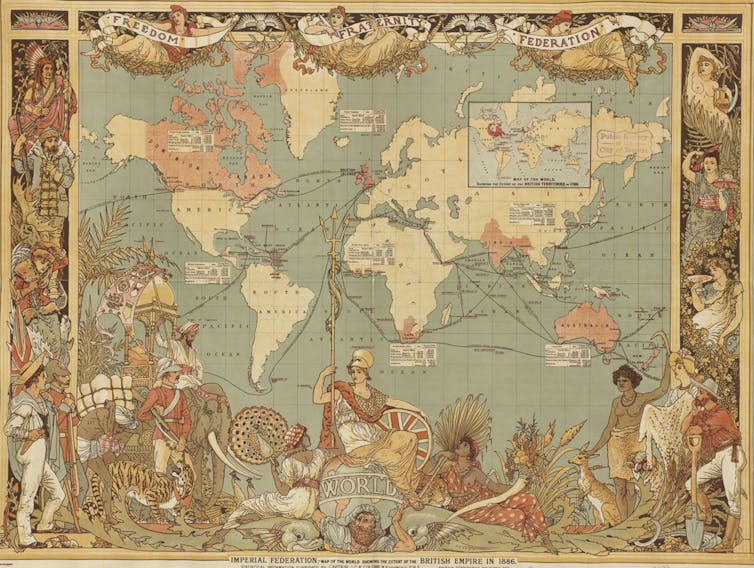 A world map displaying the extent of the British Empire in 1886.
A world map displaying the extent of the British Empire in 1886.
Norman B. Leventhal Map & Schooling Heart, Boston Public Library/Wikimedia Commons, CC BY
Trump’s tariffs have amplified the world’s financial issues, however he isn’t the foundation reason for them. Certainly, his method displays a reality that has been rising for a lot of a long time however which earlier US administrations – and different governments around the globe – have been reluctant to confess: particularly, the decline of the US because the world’s no.1 financial energy and engine of world progress.
In every period of globalisation for the reason that mid-Seventeenth century, a single nation has sought to be the clear world chief – shaping the principles of the worldwide financial system for all. In every case, this hegemonic energy had the army, political and monetary energy to implement these guidelines – and to persuade different international locations that there was no preferable path to wealth and energy.
However now, because the US below Trump slips into isolationism, there is no such thing as a different energy able to take its place and carry the torch for the foreseeable future. Many individuals’s choose, China, faces too many financial challenges, together with its lack of a very worldwide foreign money – and as a one-party state, nor does it possess the democratic mandate wanted to realize acceptance because the world’s new dominant energy.
Whereas globalisation has all the time produced many losers in addition to winners – from the slave commerce of the 18th century to displaced manufacturing facility staff within the American Midwest within the Twentieth century – historical past reveals {that a} deglobalised world could be an much more harmful and unstable place. The newest instance got here throughout the interwar years, when the US refused to take up the mantle left by the decline of Britain because the nineteenth century’s hegemonic international energy.
Within the twenty years from 1919, the world descended into financial and political chaos. Inventory market crashes and international banking failures led to widespread unemployment and growing political instability, creating the situations for the rise of fascism. International commerce declined sharply as international locations put up commerce limitations and began self-defeating foreign money wars within the useless hope of giving their international locations’ exports a lift. Quite the opposite, international progress floor to a halt.
A century on, our deglobalising world is susceptible once more. However to chart whether or not this implies we’re destined for a equally chaotic and unstable future, we first must discover the beginning, progress and causes behind the upcoming demise of this extraordinary international challenge.
French mannequin: mercantilism, cash and conflict
By the mid-1600s, France had emerged because the strongest energy in Europe – and it was the French who developed the primary overarching principle of how the worldwide financial system might work of their favour. Almost 4 centuries later, many facets of “mercantilism” have been revived by Trump’s US playbook, which may very well be entitled How To Dominate the World Financial system by Weakening Your Rivals.
France’s model of mercantilism was primarily based on the concept that a rustic ought to put up commerce limitations to restrict how a lot different international locations might promote to it, whereas boosting its personal industries to make sure that more cash (within the type of gold) got here into the nation than left it.
England and the Dutch Republic had already adopted a few of these mercantilist insurance policies, establishing colonies across the globe run by highly effective monopolistic buying and selling firms that aimed to problem and weaken the Spanish empire, which had prospered on the gold and silver it seized within the Americas. In distinction to those “seaborne empires”, the a lot bigger empires within the east corresponding to China and India had the interior assets to generate their very own income, that means worldwide commerce – though widespread – was not essential to their prosperity.

Metropolitan Museum of Artwork/Wikimedia
But it surely was France which first systematically utilized mercantilism throughout the entire of presidency coverage – led by the highly effective finance minister Jean-Baptiste Colbert (1661-1683), who had been granted unprecedented powers to strengthen the monetary may of the French state by King Louis XIV. Colbert believed commerce would enhance the coffers of the state and strengthen France’s financial system whereas weakening its rivals, stating:
It’s merely, and solely, the absence or abundance of cash inside a state [which] makes the distinction in its grandeur and energy.
In Colbert’s view, commerce was a zero-sum sport. The extra France might run a commerce surplus with different international locations, the extra gold bullion it might accumulate for the federal government and the weaker its rivals would develop into if disadvantaged of gold. Below Colbert, France pioneered protectionism, tripling its import tariffs to make overseas items prohibitively costly.
On the similar time, he strengthened France’s home industries by offering subsidies and granting them monopolies. Colonies and authorities buying and selling firms have been established to make sure France may gain advantage from the extremely profitable commerce in items corresponding to spices, sugar – and slaves.
Colbert oversaw the enlargement of French industries into areas like lace and glass-making, importing expert craftsmen from Italy and granting these new firms state monopolies. He invested closely in infrastructure such because the Canal du Midi, and dramatically elevated the dimensions of France’s navy and service provider marine to problem its British and Dutch rivals.
International commerce presently was extremely exploitative, involving the compelled seizure of gold and different uncooked supplies from newly found lands (as Spain had been doing with its conquests within the New World from the late fifteenth century). It additionally meant benefiting from the commerce in people, with big income as slaves have been seized and despatched to the Caribbean and different colonies to supply sugar and different crops.
On this period of mercantilism, commerce wars typically led to actual wars, fought throughout the globe to manage commerce routes and seize colonies. Following Colbert’s reforms, France started an extended wrestle to problem the abroad empires of its maritime rivals, whereas additionally partaking in wars of conquest in continental Europe.
France initially loved success within the Seventeenth century each on land and sea towards the Dutch. However in the end, its state-run French Indies firm was no rival to the ruthless, commercially pushed actions of the Dutch and British East India firms, which delivered huge income to their shareholders and revenues for his or her governments.
Certainly, the large income made by the Dutch from the Far Jap spice commerce explains why that they had no hesitation in handing over their small North American colony of New Amsterdam, in return for expelling the British from a small toehold of one among their spice islands in what’s now Indonesia. In 1664, that Dutch outpost was renamed New York.
After a century of battle, Britain step by step gained ascendancy over France, conquering India and forcing its nice rival to cede Canada in 1763 after the Seven Years conflict. France by no means succeeded in totally countering Britain’s naval power. Resounding defeats by fleets led by Horatio Nelson within the early nineteenth century, coupled with Napoleon’s defeat at Waterloo by a coalition of European powers, marked the top of France’s time as Europe’s hegemonic energy.
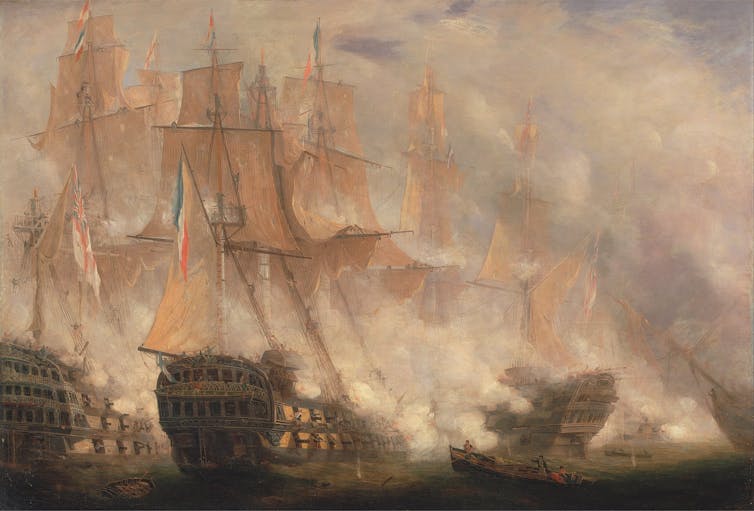
Yale Heart for British Artwork/Wikimedia
However whereas the French mannequin of globalisation in the end failed in its try and dominate the world financial system, that has not prevented different international locations – and now President Trump – from embracing its rules.
France discovered that tariffs alone couldn’t sufficiently fund its wars nor enhance its industries. Its broad model of mercantilism led to limitless wars that unfold across the globe, as international locations retaliated each economically and militarily and tried to grab territories.
Greater than two centuries later, there may be an uncomfortable parallel with what the outcomes of Trump’s limitless tariff wars may carry, each by way of ongoing battle and the organisation of rival commerce blocs. It additionally reveals that extra protectionism, as proposed by Trump, won’t be sufficient to revive the US’s home industries.
British mannequin: free commerce and empire
The ideology of free commerce was first spelled out by British economists Adam Smith and David Ricardo, the founding fathers of classical economics. They argued commerce was not a zero-sum sport, as Colbert had advised, however that every one international locations might mutually profit from it. In response to Smith’s traditional textual content, The Wealth of Nations (1776):
If a overseas nation can provide us with a commodity cheaper than we ourselves could make, higher purchase it off them with some a part of the produce of our personal trade, employed in such a method that we’ve got some benefits.
Because the world’s first industrial nation, by the 1840s Britain had created an financial powerhouse primarily based on the brand new applied sciences of steam energy, the manufacturing facility system, and railroads.
Smith and Ricardo argued towards the creation of state monopolies to manage commerce, proposing minimal state intervention in trade. Ever since, Britain’s perception in the advantages of free commerce has proved stronger and extra long-lasting than another main industrial energy – extra deeply embedded in each its politics and in style creativeness.
This ironclad dedication was born out of a bitter political wrestle within the 1840s between producers and landowners over the protectionist Corn Legal guidelines. The landowners who had historically dominated British politics backed excessive tariffs, which benefited them however resulted in larger costs for staples like bread. The repeal of the Corn Legal guidelines in 1846 upended British politics, signalling a shift of energy to the manufacturing lessons – and in the end to their working-class allies as soon as they gained the appropriate to vote.
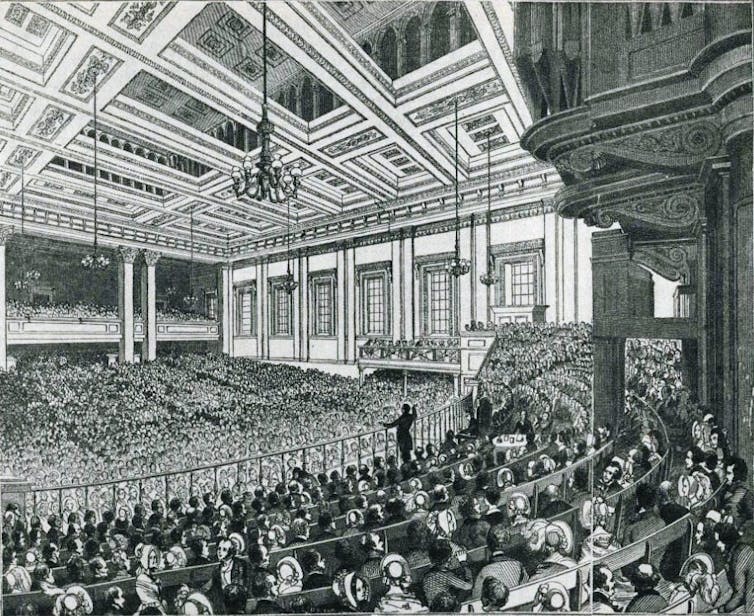
Wikimedia
In time, Britain’s advocacy of free commerce unleashed the facility of its manufacturing to dominate international markets. Free commerce was framed as the best way to boost residing requirements for the poor (the precise reverse of President Trump’s declare that it harms staff) and had robust working-class help. When the Conservatives floated the thought of abandoning free commerce within the 1906 common election, they suffered a devastating defeat – the get together’s worst till 2024.
In addition to commerce, a central aspect in Britain’s position as the brand new international hegemonic energy was the rise of the Metropolis of London because the world’s main monetary centre. The important thing was Britain’s embrace of the gold customary which put its foreign money, the pound, on the coronary heart of the brand new international financial order by linking its worth to a hard and fast quantity of gold, guaranteeing its worth wouldn’t fluctuate. Thus the pound grew to become the worldwide medium of change.
This inspired the event of a robust banking sector, underpinned by the Financial institution of England as a reputable and reliable “lender of final resort” in a monetary disaster. The consequence was an enormous increase in worldwide funding, opening entry to abroad markets for British firms and particular person buyers.
Within the late nineteenth century, the Metropolis of London dominated international finance, investing in all the things from Argentinian railways and Malaysian rubber plantations to South African gold mines. The gold customary grew to become a talisman of Britain’s energy to dominate the world financial system.
The pillars of Britain’s international financial dominance have been a extremely environment friendly manufacturing sector, a dedication to free commerce to make sure its trade had entry to international markets, and a extremely developed monetary sector which invested capital around the globe and reaped the advantages of world financial improvement. However Britain additionally didn’t hesitate to make use of power to open up overseas markets – for instance, throughout the Opium Wars of the 1840s, when China was compelled to open its markets to the profitable commerce in opium from British-owned India.
By the top of the nineteenth century, the British empire integrated one quarter of the world’s inhabitants, offering a supply of low cost labour and safe uncooked supplies in addition to a big marketplace for Britain’s manufactured items. However that was nonetheless not sufficient for its avaricious leaders: Britain additionally made positive that native industries didn’t threaten its pursuits – by undermining the Indian textile trade, for instance, and manipulating the Indian foreign money.
In actuality, globalisation on this period was about domination of the world financial system by just a few wealthy European powers, that means that a lot international financial improvement was curtailed to guard their pursuits. Below British rule between 1750 and 1900, India’s share of world industrial output declined from 25% to 2%.
However for these on the centre of Britain’s international formal and casual empire, such because the middle-class residents of London, this was a halcyon time – as economist John Maynard Keynes would later recall:
For center and higher lessons … life provided, at a low value and with the least hassle, conveniences, comforts and facilities past the compass of the richest and strongest monarchs of different ages. The inhabitant of London might order by phone, sipping his morning tea in mattress, the varied merchandise of the entire Earth, in such amount as he may see match, and fairly count on their early supply upon his doorstep.
US mannequin: protectionism to neoliberalism
Whereas Britain loved its century of world dominance, america embraced protectionism for longer after its basis in 1776 than all different main western economies.
The introduction of tariffs to guard and subsidise rising US industries had first been articulated in 1791 by the fledgling nation’s first treasury secretary, Alexander Hamilton – Caribbean immigrant, founding father and future topic of a record-breaking musical. The Whig get together below Henry Clay and its successor, the Republican Get together, have been each robust supporters of this coverage for a lot of the nineteenth century. Whilst US trade grew to overshadow all others, its authorities maintained among the highest tariff limitations on this planet.
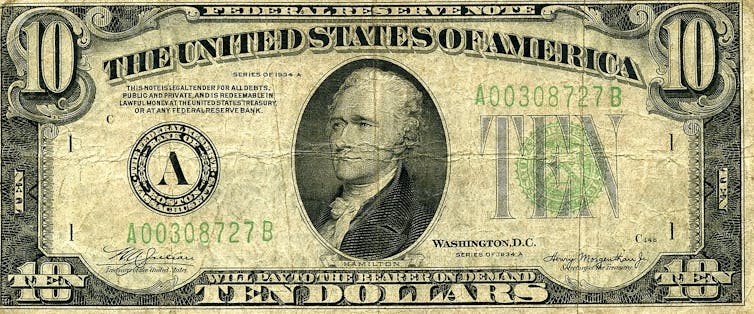
Wikimedia
Tariff charges rose to 50% within the Eighteen Nineties with the backing of future president William McKinley, each to assist industrialists and pay for beneficiant pensions for two million civil conflict veterans and their dependants – a key a part of the Republican citizens. It’s no accident that President Trump has festooned the White Home with footage of Hamilton, Clay and McKinley – all supporters of protectionism and excessive tariffs.
Partially, the US’s enduring resistance to free commerce was as a result of it had entry to an inside provide of seemingly limitless uncooked supplies, whereas its quickly rising inhabitants, fuelled by immigration, supplied inside markets that fuelled its progress whereas preserving out overseas competitors.
By the late nineteenth century, the US was the world’s greatest metal producer with the biggest railroad system on this planet and was transferring quickly to take advantage of the brand new applied sciences of the second industrial revolution – primarily based on electrical energy, petrol engines and chemical substances. But it was solely after the second world conflict that the US assumed the position of world superpower – partially as a result of it was the one nation on both facet of the conflict that had not suffered extreme injury to its financial system and infrastructure.
Within the wake of world destruction in Europe and Asia, the US’s dominance was political, army and cultural, in addition to monetary – however the US imaginative and prescient of a globalised world had some vital variations from its British predecessor.
The US took a way more universalist and rules-based method, specializing in the creation of world organisations that may set up binding laws – and open up international markets to unfettered American commerce and funding. It additionally aimed to dominate the worldwide financial order by changing the pound sterling with the US greenback as the worldwide medium of change.
Inside every week of its entry within the second world conflict, plans have been laid to determine US international monetary hegemony. The US treasury secretary, Henry Morgenthau, started work on establishing an “inter-allied stabilisation fund” – a playbook for post-war financial preparations which might enshrine the US greenback at its coronary heart.
This led to the creation of the Worldwide Financial Fund (IMF) and World Financial institution on the Bretton Woods convention in New Hampshire in 1944 – establishments dominated by the US, which inspired different international locations to undertake the identical financial mannequin each by way of free commerce and free enterprise. The Allied nations who have been concurrently assembly to determine the United Nations to attempt to make sure future world peace, having suffered the devastating results of the Nice Melancholy and conflict, welcomed the US’s dedication to form a brand new, extra steady financial order.
Because the world’s greatest and strongest financial system, there was (initially) little resistance to this US plan for a brand new worldwide financial order in its personal picture. The motive was as a lot political as financial: the US wished to offer financial advantages to make sure the loyalty of its key allies and counter the perceived menace of a communist takeover – in full distinction to Trump’s mercantilist view right this moment that every one different international locations are out to “rip off” the US, and that its personal army may means it has no actual want for allies.
After the conflict lastly ended, the US greenback, now linked to gold at a hard and fast charge of $35 per ounce to ensure its stability, assumed the position because the free world’s principal foreign money. It was each used for international commerce transactions and held by overseas central banks as their foreign money reserves – giving the US financial system an “exorbitant privilege”. The steady worth of the greenback additionally made it simpler for the US authorities to promote Treasury bonds to overseas buyers, enabling it to extra simply borrow cash and run up commerce deficits with different international locations.
The situations have been set for an period of US political, monetary and cultural dominance, which noticed the rise of worldwide admired manufacturers corresponding to McDonald’s and Coca Cola, in addition to a strong US advertising arm within the type of Hollywood. Maybe much more considerably, the relaxed, well-funded campuses of California would show an ideal petri dish for the event of latest pc applied sciences – backed initially by chilly conflict army funding – which, a long time later, would result in the beginning of the big-tech firms that dominate the tech panorama right this moment.
The US view of globalisation was broader and extra interventionist than the British mannequin of free commerce and empire. Relatively than having a proper empire, it wished to open up entry to the complete world financial system, which would supply international markets for American services.
The US believed you wanted international financial establishments to police these guidelines. However as within the British case, the advantages of globalisation have been nonetheless erratically shared. Whereas international locations that embraced export-led progress corresponding to Japan, Korea and Germany prospered, different resource-rich however capital-poor international locations corresponding to Nigeria solely fell additional behind.
From dream to despair
Although the legend of the American dream grew and grew, by the Seventies the US financial system was coming below growing strain – particularly from German and Japanese rivals, who by then had recovered from the conflict and modernised their industries.
Troubled by these perceived threats and a rising commerce deficit, in 1971 President Richard Nixon shocked the world by saying that the US was going off the gold customary – forcing different international locations to bear the price of adjustment for the US steadiness of funds disaster by making them revalue their currencies. This had a profound impact on the worldwide monetary system: inside a decade, most main currencies had deserted fastened change charges for a brand new system of floating charges, successfully ending the 1944 Bretton Woods settlement.
The tip of fastened change charges opened the door to the “financialisation” of the worldwide financial system, vastly increasing international funding and lending – a lot of it by US monetary companies. This gave succour to the burgeoning neoliberal motion that sought to additional rewrite the principles of the monetary world order. Within the Nineteen Eighties and ’90s, these coverage prescriptions grew to become generally known as the Washington consensus: a algorithm – together with opening markets to overseas funding, deregulation and privatisation – that was imposed on creating economies in disaster, in return for them receiving help from US-led organisations just like the World Financial institution and IMF.
Within the US, in the meantime, the growing reliance on the finance and hi-tech sectors elevated ranges of inequality and fostered resentment in massive components of American society. Each Republicans and Democrats embraced this new world order, shaping US coverage to favour their hi-tech and monetary allies. Certainly, it was the Democrats who performed a key position in deregulating the monetary sector within the Nineteen Nineties.
In the meantime, the decline of US manufacturing industries accelerated, as did the hole between the incomes of these within the hinterland, the place manufacturing was primarily based, and residents of the massive metropolitan cities.
By 2023, the bottom 50% of US residents acquired simply 13% of complete private earnings, whereas the highest 10% acquired virtually half (47%). The wealth hole was even better, with the underside 50% solely having 6% of complete wealth, whereas a 3rd (36%) was held by simply the highest 1%. Since 1980, actual incomes of the underside 50% have barely grown for 4 a long time.
The underside half of the US inhabitants was affected by a surge in “deaths of despair” – a time period coined by the Nobel-winning economist Angus Deaton to explain excessive mortality charges from drug abuse, suicide and homicide amongst youthful working-class Individuals. Rising prices of housing, medical care and college training all contributed to widespread indebtedness and rising monetary insecurity. By 2019, a examine discovered that two-thirds of people that filed for chapter cited medical points as a key purpose.
The decline in US manufacturing accelerated after China was admitted to the World Commerce Group in 2001, growing America’s hovering commerce and funds deficit much more. Political and enterprise elites hoped the transfer would open up the large Chinese language market to US items and funding, however China’s fast modernisation made its trade extra aggressive than its American rivals in lots of fields.
In the end, this period of intensive financialisation of the world financial system created a collection of regional after which international monetary crises, damaging the economies of many Latin American and Asian economies. This culminated within the 2008 international monetary disaster, precipitated by reckless lending by US monetary establishments. The world financial system took greater than a decade to get better as international locations wrestled with slower progress, decrease productiveness and fewer commerce than earlier than the disaster.
For many who selected to learn it, the writing was on the wall for America’s period of world domination a long time in the past. However it might take Trump’s victory within the 2016 presidential election – a profound shock to many within the US “liberal institution” – to clarify that the US was now on a really totally different course that may shake up the world.
Making a foul state of affairs extra harmful
In my opinion, Trump is the primary modern-day US president to completely perceive the highly effective alienation felt by many working-class American voters, who believed they have been omitted of the US’s immense post-war financial progress that so benefited the largely city American center lessons. His strongest supporters have all the time been lower-middle-class voters from rural areas who should not college-educated.
But Trump’s key insurance policies will in the end do little for them. Excessive tariffs to guard US jobs, expulsion of thousands and thousands of unlawful immigrants, dismantling protections for minorities by opposing DEI (variety, equality and inclusion) programmes, and drastically slicing again the dimensions of presidency may have more and more detrimental financial penalties sooner or later, and are most unlikely to revive the US financial system to its earlier dominant place.
Lengthy earlier than he first grew to become president, Trump hated the eye-watering US commerce deficit (he’s a businessman, in any case) – and believed that tariffs can be a key weapon for guaranteeing US financial dominance may very well be maintained. One other key a part of his “America First” ideology was to repudiate the worldwide agreements that have been on the coronary heart of the US’s postwar method to globalisation.
In his first time period, nonetheless, Trump (having not anticipated to win) was ill-prepared for energy. However second time round, conservative thinktanks had spent years outlining detailed insurance policies and figuring out key personnel who might implement the novel U-turn in US financial coverage.
Below Trump 2.0, we’ve got seen a return to the mercantilist viewpoint paying homage to France within the Seventeenth and 18th centuries. His assertion that international locations which ran a commerce surplus with the US “have been ripping us off” echoed the mercantilist perception that commerce was a zero-sum sport – quite than the Twentieth-century view, pioneered by the US, that globalisation brings advantages to all, irrespective of the exact steadiness of that commerce.
Trump’s tax-and-tariff plans, which lengthen the tax breaks to the very wealthy whereas decreasing advantages for the poor by means of profit cuts and tariff-driven inflation, will enhance inequality within the US.
On the similar time, the passing of the One Huge Stunning Invoice is predicted so as to add some US$3.5 trillion to US authorities debt – even after the Elon Musk-led “Division of Authorities Effectivity” cuts imposed on many Washington departments. This provides strain to the important thing US Treasury bond market on the centre of the world monetary system, and raises the price of financing the large US deficit whereas weakening its credit standing. Persevering with these insurance policies might threaten a default by the US, which might have devastating penalties for the complete international monetary system.
For all of the macho grandstanding from Trump and his supporters, his financial insurance policies are an indication of American weak point, not power. Whereas I imagine his highlighting of among the ills of the US financial system have been overdue, the president is quickly squandering the financial credibility and good will that the US constructed up within the postwar years, in addition to its cultural and political hegemony. For individuals residing in America and elsewhere, he’s making a foul state of affairs extra harmful – together with for a lot of of his most ardent supporters.
That mentioned, even with out Trump’s financial and societal disruptions, the top of the US period of hegemonic dominance would nonetheless have occurred. Globalisation is just not useless, however it’s dying. The troubling query all of us face now, is what occurs subsequent.
That is the primary of a two-part Insights lengthy learn on the rise and fall of globalisation. Learn half two right here: why the following international monetary meltdown may very well be a lot worse with the US on the sidelines.
In regards to the Writer:
Steve Schifferes, Honorary Analysis Fellow, Metropolis Political Financial system Analysis Centre, Metropolis St George’s, College of London
This text is republished from The Dialog below a Artistic Commons license. Learn the authentic article.

